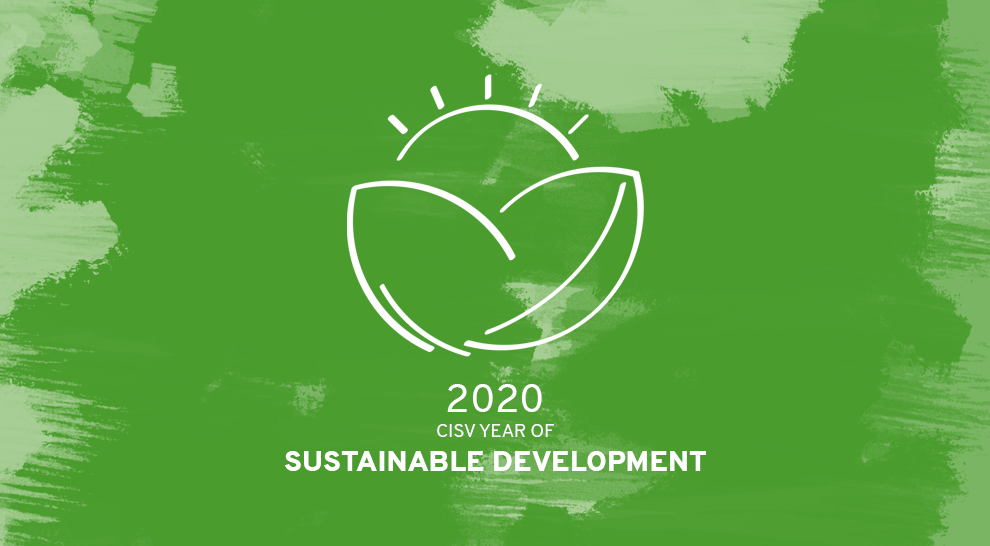How Do We Educate for Sustainable Development?
Digging Deeper with Dig In
May 9, 2016Reflections on Peace Education from the Kompaz Team
June 6, 2016How Do We Educate for Sustainable Development?
2016 is CISV’s year for Sustainable Development. Throughout the year, we will bring you ideas, discussion pieces, materials and resources to help you to explore, educate on, and take action toward Sustainable Development in your Chapter or Programme.
Hi there!
In the months leading up to CISV’s busy summer programme season, hundreds of CISVers are training and preparing to go to programmes where they will be acting on CISV’s mission statement (to educate and inspire action for a more just and peaceful world) in the most tangible way: by preparing and leading educational activities for participants.
With this post, we want to explore the question: how should we approach educating for Sustainable Development? What makes this content area unique? What should you keep in mind when preparing and leading an activity?
In CISV, Sustainable Development is one of four content areas of peace education, and in documents such as The Passport and Big Ed it is defined like this: “Looks for integrated ways to promote economic and social well-being, while protecting the environment through the responsible use of natural resources.”
Some important things to keep in mind
It’s not just about the environment
Perhaps more than any other CISV content area, Sustainable Development touches on every aspect of human life. Going well beyond issues related to the environment it connects with domains like politics, business, science, technology, and touches on issues like poverty, gender, healthcare, urbanism, and more. Remember to take a wide perspective and aim for activities that explore the connections between these various domains.
There is so much happening right now
From the Paris Climate Summit to the UN Sustainable Development Goals, to the falling price of oil, to the migrant crisis, there are an endless number of very current, highly relevant issues (locally and globally) that can be explored in relation to Sustainable Development. Explore ways to weave these into your activities and debriefs!
It’s inherently value-laden and political
When educating on Sustainable Development values and politics will come into play. Here’s an example; imagine a situation where a community must decide what is more important: expanding housing or preserving living space for a rare species of birds. Citizens and decision makers will have to make value judgments that compare the interests of economic development and species conservation. Different people will have different perspectives on this question, based on their beliefs and values.
It’s important to keep this in mind, be highly aware of values, and strive to always create activities and discussions that support participants to draw their own conclusions, and takeaways, rather than imposing ‘right’ answers.
Some tips when you plan and run activities
Create experience-based activities
Across all its programmes, CISV’s educational approach is experiential learning. This is as important with Sustainable Development as with anything else. While it could be easy to get overwhelmed by all the issues, all the information, and all the perspectives, remember to base your activities in simple and powerful experiences that participants can learn from, including things like role-play, simulation, debate, storytelling, reflection and discussion, and creativity.
Connect the local and the global
Help participants draw the connections between global issues/events and their local context. Include questions that invite participants to make these connections and ask them to share stories, perspectives, and experiences when they do. Grounding learning in participants’ local realities will make it more enduring and easier to act on.
Go from learning to action!
Building on the above, encourage participants to reflect on and talk about how they can turn their learning into action in their communities. Challenge them to think about how they can take action for a more just and peaceful world in ways that relate to Sustainable Development.
We hope you’ll take some inspiration and useful insights from this post. For a great collection of Sustainable Development activities, visit the activities section of CISV’s website.
Stay tuned for more from the Sustainable Development 2016 team soon!
Yours,
Alex Neuman
on behalf of the Sustainable Development Team
The Sustainable Development Team includes members of CISV’s Educational Programmes Committee, Kompaz Project, International Junior Branch Team, Communications Team, and the International Office. Our team coordinator is Madeleine Le Bourdon.



